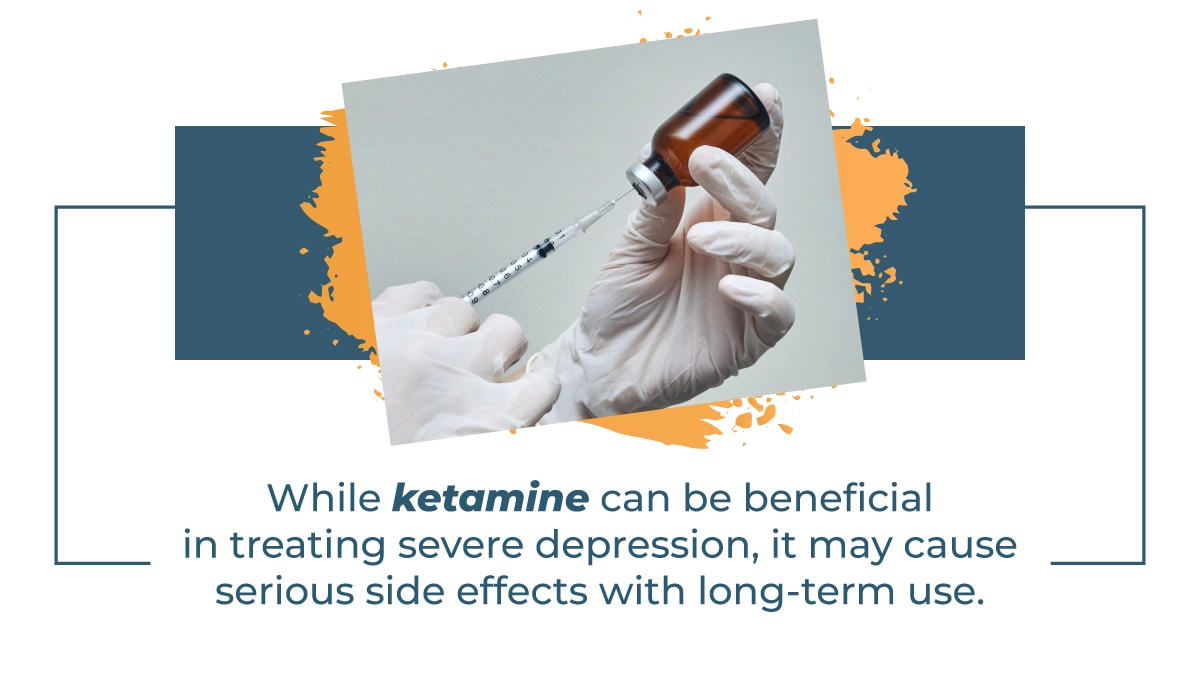
Lyrica With Suboxone: Risks And Safe Practices
The Recovery Team-Newton explores whether taking Lyrica with Suboxone is safe. Explore potential risks and guidelines

Ketamine, once known primarily as an anesthetic, is now emerging as a promising treatment for severe depression, especially for those who have not responded well to traditional therapies. Its rapid effects can offer significant relief from severe depression symptoms. However, while ketamine can be effective, it’s essential to understand the possible side effects that might arise with extended use.
Continue reading as we explore the potential long-term side effects of ketamine treatment for depression to help you make informed decisions about this therapy.
Ketamine is a fast-acting treatment option for severe depression, but understanding its effects and risks is vital. Here is what you need to know:
If you’re struggling with ketamine addiction, The Recovery Team-Newton offers tailored treatment plans and support to help you regain control. Contact us at (508) 978-2772 today.

Ketamine is a prescription medication initially used as an anesthetic in surgeries. In recent years, it has gained attention for the treatment of depression, particularly in cases where traditional treatments haven’t been effective. Depending on the treatment plan, it is usually administered in a clinical setting through intravenous (IV) infusion, nasal spray, or other methods.
Ketamine works differently from other antidepressants. It targets a neurotransmitter called glutamate in the brain, which helps to improve mood and reduce depressive symptoms quickly. This action is believed to help “reset” brain circuits involved in mood regulation. By doing so, ketamine can offer relief to people who haven’t found success with standard treatments.
While ketamine treatment can offer quick relief from depressive disorders, it’s important to consider its long-term effects. Research is still ongoing to fully understand how prolonged use of ketamine may impact overall health. Patients should work closely with their healthcare provider to monitor side effects and determine the best treatment approach.
Ketamine can have several short-term effects on the body and mind, especially during or shortly after treatment. Here are some of the common ones:
Euphoria: Some people feel an intense sense of joy or happiness when using ketamine. This feeling, euphoria, can be strong but is usually temporary.
Dissociation: Dissociation makes people feel disconnected from their surroundings or body. It can create a sense of detachment, which might be uncomfortable for some.
Dizziness: Feeling dizzy is a common short-term effect. This might make a person feel unsteady or lightheaded, which can affect your balance.
Nausea: Ketamine can sometimes cause nausea, making a person feel like they might throw up. This can be uncomfortable and may last for a short time.
Hallucinations: Some people might experience hallucinations, where they see or hear things that aren’t there. These experiences can be unsettling or confusing.
Confusion: Another possible short-term effect is confusion. People may struggle to think clearly or understand what is happening around them.
Increased Heart Rate: Ketamine may cause the heart to beat faster than usual, which can be felt as a racing or pounding sensation.
High Blood Pressure: An increase in blood pressure is also possible with ketamine use. This can be an issue, especially for those with pre-existing heart conditions.
Sedation: Feeling very sleepy or sedated is common with ketamine use. This effect can make staying awake and alert during and after treatment difficult.
Blurred Vision: Ketamine can cause blurred vision, where things may appear out of focus. This effect can impact the ability to see clearly for a short period.
While these common side effects usually wear off within hours, it’s essential to be aware of them when considering ketamine treatment for depression.
While ketamine can be effective in the case of treatment-resistant depression (TRD), its long-term use may lead to serious side effects. Here are the potential long-term side effects.
One major concern with long-term ketamine use is cognitive impairment. This includes problems with memory, attention, and learning. People might find it harder to concentrate or remember things. This can affect everyday activities and overall quality of life. While cognitive impairment might vary in severity, it is a notable risk associated with extended use of ketamine.
Another serious side effect of long-term ketamine use involves bladder and urinary problems. Individuals may experience symptoms such as frequent urination, pain during urination, or bladder inflammation. In severe cases, chronic ketamine use can lead to a condition called “ketamine bladder syndrome,” which can cause significant discomfort and affect urinary tract health.
Long-term ketamine use may also affect cardiovascular health. Users might experience increased blood pressure, heart rate irregularities, or other heart-related problems. These cardiovascular issues can pose risks, especially for individuals with pre-existing heart conditions. Regular cardiovascular monitoring is important to identify and address any heart-related side effects early.
Another possible side effect of long-term ketamine use is liver damage. The liver processes many drugs, including ketamine. Over time, this can lead to liver stress or damage. Symptoms of liver issues can include jaundice (yellowing of the skin), abdominal pain, and unusual fatigue. Regular liver function tests may be required to monitor the liver’s health while on ketamine.
Dependency and tolerance are significant concerns with long-term ketamine use. Over time, individuals may develop a tolerance, meaning they need larger doses to achieve the same effects. This can lead to dependency, where a person feels they need ketamine to function normally and may experience uncomfortable withdrawal symptoms if they try to stop using it.
Ironically, long-term ketamine use can also raise mental health concerns. While ketamine is effective in treating depression, it can sometimes lead to or exacerbate other mental health issues, such as anxiety, hallucinations, delusions, or mood swings. Users may experience fluctuations in mental health that require ongoing assessment and management to ensure overall well-being.
Awareness and regular monitoring are key to managing these risks and ensuring that the benefits of ketamine treatment for depression outweigh the potential harms.
When using ketamine for depression, several factors can influence the likelihood of experiencing side effects. Here’s a look at some important considerations.
The amount of ketamine and how often it is given can affect side effects. Higher doses or more frequent use can elevate the risk of unwanted effects. The dosage needs to be tailored to the individual’s needs, as too much ketamine may lead to more severe side effects.
People with certain health conditions may be at higher risk for side effects from ketamine. For example, those with liver or kidney problems might experience more severe reactions. Existing health issues can affect how the body processes ketamine, leading to more pronounced side effects.
A history of substance abuse and addiction can influence how ketamine affects someone. People who have struggled with drug or alcohol use may be more sensitive to the drug’s effects. This sensitivity can lead to a greater risk of negative side effects or interactions with the medication.
Ketamine can interact with other medications, leading to unexpected side effects. For example, combining it with certain antidepressants or other drugs might alter how ketamine works. These interactions can increase the chance of experiencing side effects or complicate the treatment process.
Taking ketamine without proper medical supervision can heighten the risk of side effects. A healthcare provider monitors the treatment to ensure it works effectively and safely. Without this oversight, the risk of adverse effects can be higher.
Being aware of these risk factors can aid you in understanding why side effects from ketamine might occur and be prepared and informed about your treatment.
When undergoing ketamine therapy for depression, managing potential side effects is essential for ensuring the best outcomes. Here are some key approaches to consider:
Regular monitoring by a healthcare provider is essential when using ketamine. This includes frequent check-ups to assess how the treatment is affecting you. Routine tests can help track any side effects early on, promptly addressing any issues. Regular evaluations help adjust the treatment plan, keeping the therapy safe and effective.
Controlling the dosage and frequency of ketamine administration can help reduce the risk of side effects. Using the lowest effective dose and limiting how often the medication is given can minimize the strain on the body. This approach helps balance the benefits of ketamine therapy with the risks of adverse effects, making the treatment safer for long-term use.
If ketamine’s side effects become a concern, exploring alternative treatment options may be beneficial. There are various other options for managing depression, such as different types of medication, therapeutic approaches, or healthy lifestyle changes. Discussing these options with your healthcare provider can help you find the best treatment plan tailored to your needs.
Maintaining a healthy lifestyle can support overall well-being and potentially reduce the impact of ketamine’s side effects. Eating a balanced diet, exercising regularly, and getting adequate sleep is important for improving mental and physical health. These healthy habits can enhance the effectiveness of your treatment and help manage any side effects more effectively.
Each strategy ensures that the treatment remains safe and effective, helping you achieve better results and maintain overall health.
Long-term use of ketamine for depression can impact cognitive function. Some recent studies suggest that chronic use might lead to memory issues, attention difficulties, and slower processing speeds. While ketamine is effective for treating depression, its impact on cognitive abilities over time is a concern.
When using ketamine long-term, it is essential to monitor cognitive health closely and discuss any cognitive changes with a healthcare provider. Regular assessments can help manage and mitigate potential side effects, ensuring that the benefits of treatment outweigh any risks to cognitive function.
There are potential risks of dependency or addiction with prolonged ketamine treatment. Ketamine is primarily used as an anesthetic and, more recently, for its antidepressant effects in specific cases. However, long-term use can lead to tolerance, where high doses are needed to achieve the same effect.
This can raise the risk of dependency, where individuals might feel they need the drug to function normally. This can lead to the onset of addiction, a condition marked by compulsive drug use despite adverse effects. Regular monitoring by healthcare professionals is vital to mitigate these risks.
Are you feeling overwhelmed by ketamine use and unsure where to turn? Don’t worry. The Recovery Team-Newton offers the support and guidance you need to overcome your struggles.
Our day treatment program offers a variety of care options to suit your needs. We provide customized treatment plans that include therapy sessions, medication-assisted treatment (MAT), holistic therapies, and support from peers who understand what you’re going through.
We understand that addiction can often lead to other mental health challenges as well. That’s why we offer a dual diagnosis program to address both issues that might be affecting you. Our approach is all about supporting you in every aspect of your recovery.
Don’t wait to start your journey to a better life. Contact us at (508) 978-2772 to find out how our team of experts can help. Remember, support is available, and hope for a brighter tomorrow exists.

The Recovery Team-Newton explores whether taking Lyrica with Suboxone is safe. Explore potential risks and guidelines

Learn about Suboxone injection side effects and explore recovery solutions in this guide by The Recovery Team-Newton.